In 2010, after more than six decades in operation, central Vermont’s Ascutney Mountain Resort stopped spinning its lifts. The existing infrastructure was left to rot and rust, the trails have grown into a mangled mess of brush, and the closure dealt a serious blow to the area’s economy. Now, a group of impassioned townspeople, skiers and mountain bikers are working to buy back and revitalize their ski hill. And backcountry skiing and riding is part of their plan.
On a cold February morning in West Windsor, Vt., the scene at the base of Ascutney Mountain Resort is particularly chilling. For nearly five years, the lifts haven’t spun and the trails have grown into a mangled mess of maple, poplar and birch seedlings. But most eerie is the sight of the base lodge, once the busy hub of this central Vermont ski area. Before dawn on a subzero morning about a month earlier, a fire ripped through the abandoned building, burning the grafittied, light blue walls and sinking the roof into a charred heap of wood, ash and snow.
The depressing scene can’t diminish the drive of a few spirited skiers, however. Jim Lyall, Kate Wanner and Erik Schutz are sticking skins to their skis in an empty parking lot nearby. Their plan for today includes skinning the shuttered ski hill and dropping into the nearby backcountry, but they have a much greater goal.
They’re working to purchase and conserve the land on which Ascutney Mountain Resort once operated and, together with local nonprofits and the townspeople of West Windsor, reopen Ascutney as a community ski hill with hike-to terrain and summertime mountain bike trails. And after five years, this hurting ski town needs its hill back.
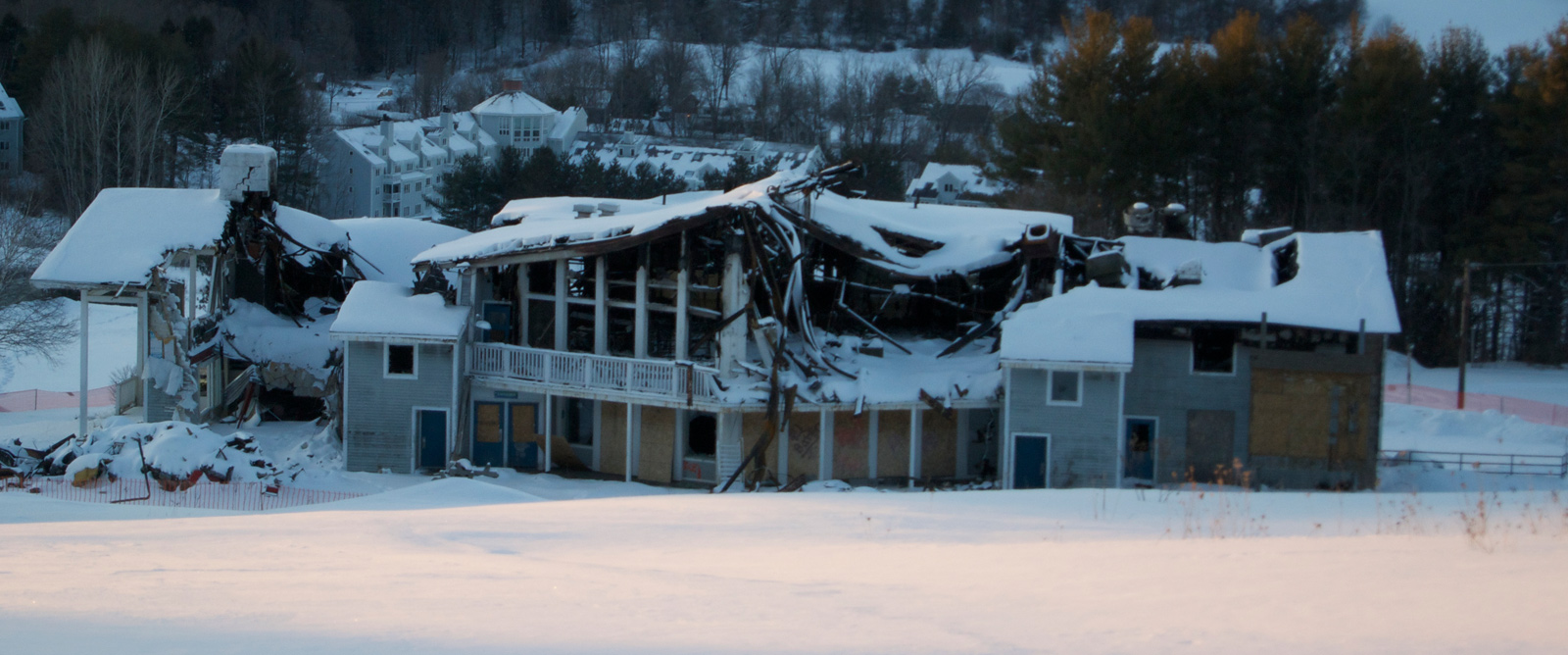
The destroyed base lodge following the January 8 fire. According to West Windsor Fire Chief Mike Spackman, the temperature that morning was about 10 below zero when firefighters arrived before dawn. The base lodge is not included in the land sale. [Photo] Tyler Cohen
Jim Lyall is the reason Kate, Erik and I are here today. He organized today’s tour, but he’s also a driver behind the town’s anticipated purchase, conservation and management of the land. As we glide up a well-packed skintrack, Lyall tells me about the mountain bike trails he’s built in the area, including much of the last half of the Vermont 50, a popular 50-mile mountain bike race that begins and ends at Ascutney. The Vermont Mountain Bike Festival is here annually, too.
In 2005, along with Schutz, Lyall cofounded Sports Trails of the Ascutney Basin (STAB), a nonprofit that maintains 35 miles of mountain bike and recreation trails on the ski hill and throughout the valley. Lyall’s connections to Ascutney, however, go back to the mid ’70s, a four-decade span that represents the ski area’s rockiest history.
Ascutney Mountain Resort’s existence has the ups and downs of a mountainous ridgeline, quite unlike the profile of the singular, broad monadnock on which the embroiled ski area operated for more than six decades. In the winter of 1935/36, the Civilian Conservation Corps and Windsor Outing Club carved the Mt. Ascutney Trail down the 3,130-foot peak’s northeast slope. Ascutney Slopes’ first two rope tows were erected in 1946, and, according to NewEnglandSkiHistory.com, the area drew a crowd of 800 during that year’s Christmas holiday week.![A postcard featuring the undeveloped eastern slope of Mt. Ascutney as taken from Cornish, N.H. around 1910. [Photo] Unknown](http://backcountrymagazine.com/wp-content/uploads/2015/05/historicmap.jpg)
A postcard featuring the undeveloped eastern slope of Mt. Ascutney as taken from Cornish, N.H. around 1910. [Photo] Unknown
The most recent owners, the Plausteiner family, reopened the resort in December 1993 after purchasing the property at auction for $1.1 million. But by 2008, the Plausteiners’ coffers were empty, and they sold their shares to MFW Associates in order to liquidate the area to cover nearly $2 million in debt, including $25,000 owed to the town. The resort closed indefinitely in the summer of 2010.
“The year it closed, there was a superhighway—a skintrack and a snowshoe track—to the top,” Erik Schutz says. “It’s tapered a bit recently, but once it snows here, people show up.” In 2014, MFW announced its plans to sell off the remaining four chairlifts to cover its debts and back taxes, effectively ending any hopes that a buyer might revitalize the resort. “I was optimistic until this past year. It feels like there is no hope anymore,” Amy Yates, owner of the Brownsville General Store, told the Valley News that May. “It makes me sad. I grew up learning to ski on the mountain so it is especially hard for me to see.”“It hurt,” Schutz adds. “A little more than half of the homes in town are vacation homes, so a lot of property maintenance guys and ski patrol had to find new jobs. I think it hurt the general store. There are a few bed and breakfasts that just aren’t here anymore. They couldn’t depend on the outside money anymore.”
But a special town meeting held at Brownsville’s Story Memorial Hall last October gave West Windsor residents reason to be optimistic. By a vote of 254 to 79, voters approved the town’s purchase of 470 acres of the former Ascutney Mountain Resort from MFW for $640,000. Following the vote, the headline “Town Buys Ascutney Trails” ran above the fold in the Valley News, and the photo captures the hall packed with townspeople smiling and applauding. One woman even appears to be crying.
As we climb the brush-filled slopes, Kate shares her perspective on the project, for which she’s working to raise funds and develop a management plan. “I’ve never been involved with a project that has so much support and so many people excited and involved,” she says. “It’s really special.”
Wanner works in Montpelier as a project manager with the Trust for Public Land (TPL), a national nonprofit that specializes in conserving and protecting land. Over the past four decades, TPL has conserved some 3.3-million acres nationwide and more than 54,000 acres of forestland across Vermont. Wanner began working with the town of West Windsor in November 2013 in order to secure the existing trail network and former resort property, and, the following the October 2014 vote, TPL secured the property under contract in January of this year.
For her part, Wanner thinks that acquiring large, public grants—from sources like the federal Community Forest Program and the Vermont Housing and Conservation Board—as well as several private grants, shouldn’t be difficult given the level of support for the project and Ascutney’s unique ecologic value.
“Ascutney itself is really a biodiversity hotspot due to its significance as a monadnock, its steepness and its place in Vermont,” Wanner says, mentioning significant natural communities and old-growth forests that provide habitat to bobcat, bear and moose.
The existing town forest, which totals 1,112 acres west and south of ski area’s land, abuts the 2,700-acre Mt. Ascutney State Park and the 650-acre Little Ascutney Wildlife Management Area. “With this addition,” Wanner says, “the conservation and expansion of the West Windsor Town Forest will create the biggest conserved block of land adjacent to the Connecticut River in Vermont. It really is kind of a jewel within the Upper Valley.”A half hour into our skin, the uptrack jogs right into a narrow trail lined by straight pines that resemble telephone poles. “I think its one of the largest red pine forests in the area,” Jim says. “When I ski out there, I feel like I’m out West.”
We break back for the main trail, which sprawls the width of a football field and pitches downward at a consistent, 35-degree angle. The snowy ridgeline of Mt. Washington, New Hampshire’s tallest peak, rises far to the northeast.
![The Trust for Public Land's map of the Ascutney Mountain Project. [Image] Courtesy Trust for Public Land](http://backcountrymagazine.com/wp-content/uploads/2015/05/landmap3.jpg)
The Trust for Public Land’s map of the Ascutney Mountain Project. [Image] Courtesy Trust for Public Land
The ski-area land will be added to the West Windsor Town Forest and protected by an easement held by Vermont Housing and Conservation Board and the Upper Valley Land Trust. And STAB, or some to-be-formed nonprofit, would spearhead managing and maintaining the trails. But first TPL needs to raise the funds by July 1. And while the former resort land costs $640,000, the total project cost—including legal work, surveying, stewardship and management endowments and more—tops $905,000.
Kate’s optimistic, however, that they’ll be able to raise the funds. “So many people are psyched on this project,” she mentions when we keep skinning.
Jim and Erik are two of those people; just two of 1,000 townspeople who live in the Ascutney basin that’s been without its ski hill for half a decade and two of many more thousands who mountain biked, hiked and skied on this monadnock’s trails. They skin on from our vista that overlooks West Windsor past a shed with shattered windows. And in their strides is a determination far greater than reaching the top. ♦
Afterword: West Windsor held a special town meeting in early May to fill the select-board seat of Glenn Seward, a strong proponent of Ascutney’s revitalization who, according to the Valley News, resigned following insinuations that he might benefit personally from the project. Ted Siegler, Chairman of the Conservation Commission and a skier and mountain biker, will fill his seat.
Voters also approved a measure to allow the select board the option to purchase a mountain-access road. >>
As of early May, the Vermont Housing and Conservation Board granted this project $300,000 and the Trust for Public Land secured a grant of $216,000 from the Open Space Institute to split between Ascutney Mountain and a community forest in Milan, New Hampshire. Several other grants, including a $340,000 request from the federal Community Forest Program, are still pending.
The Ascutney Mountain Project has also been nominated for a potential grant from the Conservation Alliance. >>
On May 13, the Trust for Public Land launched “The Campaign to Protect Ascutney Mountain,” to raise $135,000 in public donations.
To find out more about this fundraiser or to make a donation, visit support.tpl.org. ♦


![Jim Lyall points out the plan for the day to Kate Wanner. [Photo] Tyler Cohen](http://backcountrymagazine.com/wp-content/uploads/2015/05/maps.jpg)
![Brush and bramble on the Ascutney ascent. [Photo] Tyler Cohen](http://backcountrymagazine.com/wp-content/uploads/2015/05/skinning6.jpg)
![[Image] NewEnglandSkiHistory.com](http://backcountrymagazine.com/wp-content/uploads/2015/05/skimap2.jpg)
![Lyall, Wanner and Schutz on the Ascutney Superhighway. [Photo] Tyler Cohen](http://backcountrymagazine.com/wp-content/uploads/2015/05/skinning3.jpg)
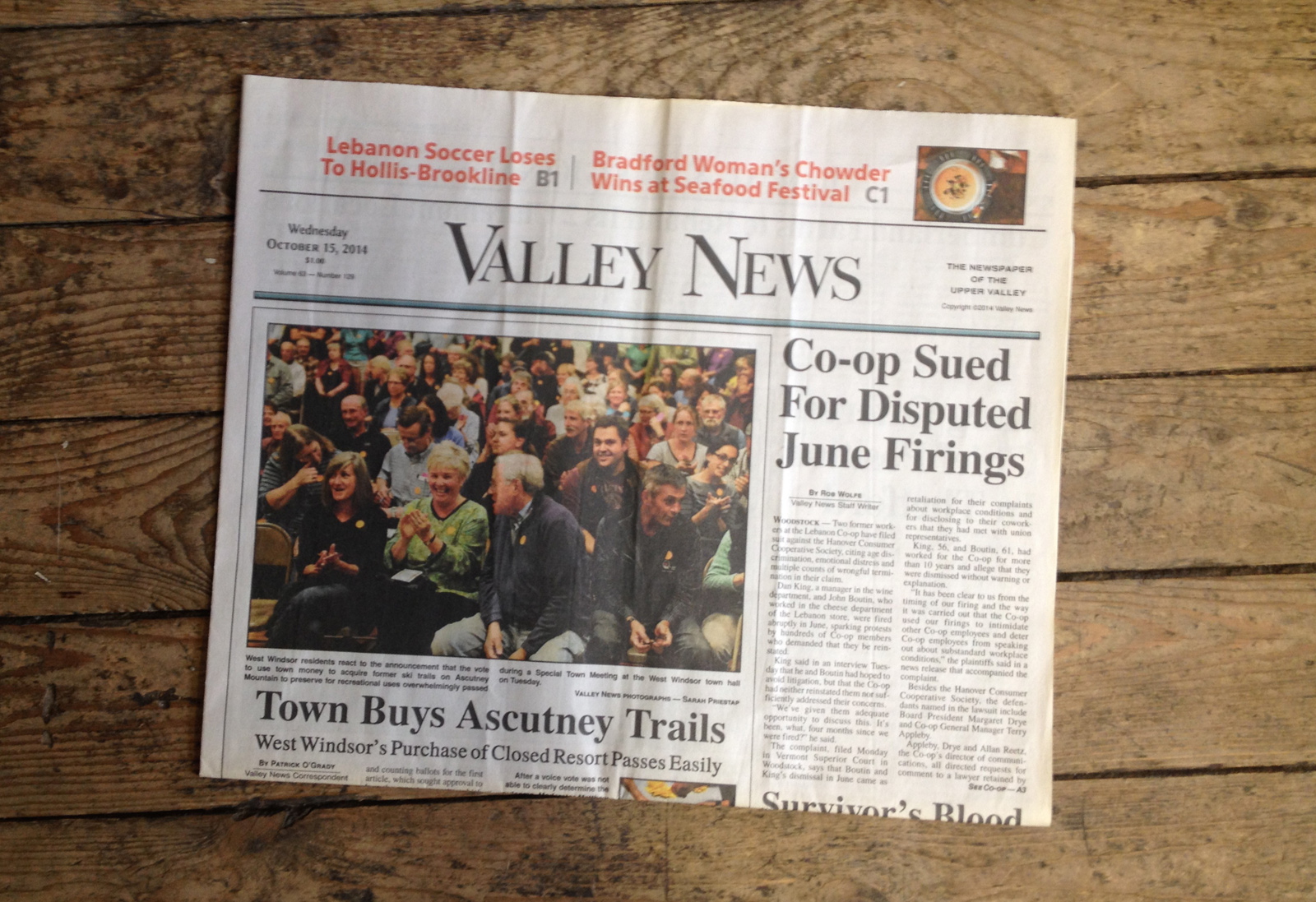
![Kate Wanner, project manager with the Trust for Public Land. [Photo] Tyler Cohen](http://backcountrymagazine.com/wp-content/uploads/2015/05/wanner.jpg)
![Jim Lyall leads the charge to bring Ascutney to new heights. [Photo] Tyler Cohen](http://backcountrymagazine.com/wp-content/uploads/2015/05/skinning11.jpg)
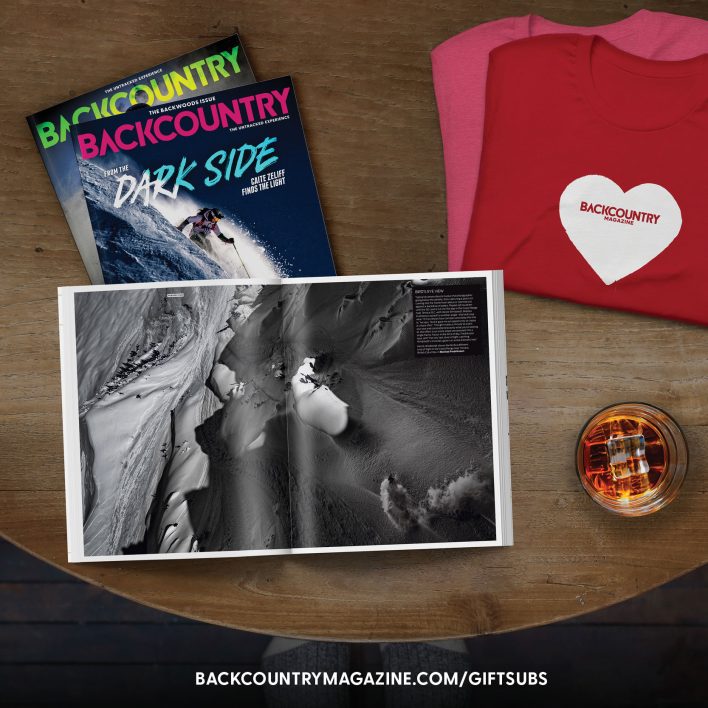




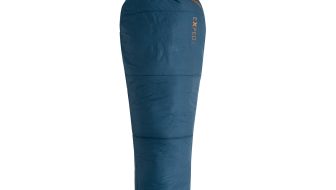
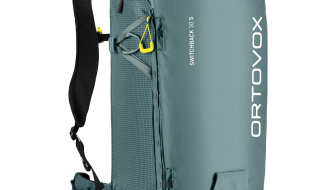

Related posts: